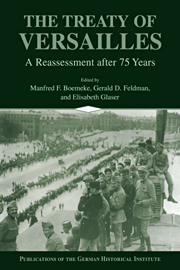Book contents
- Frontmatter
- Introduction
- Prologue: 1919-1945-1989
- PART ONE PEACE PLANNING AND THE ACTUALITIES OF THE ARMISTICE
- PART TWO THE PEACEMAKERS AND THEIR HOME FRONTS
- PART THREE THE RECONSTRUCTION OF EUROPE AND THE SETTLEMENT OF ACCOUNTS
- PART FOUR THE LEGACY AND CONSEQUENCES OF VERSAILLES
- PART FIVE ANTECEDENTS AND AFTERMATHS REFLECTIONS ON THE WAR-GUILT QUESTION AND THE SETTLEMENT
- 22 Max Weber and the Peace Treaty of Versailles
- 23 The Construction of the American Interpretation: The Pro-Treaty Version
- 24 British Revisionism
- 25 Woodrow Wilson's Image of Germany, the War-Guilt Question, and the Treaty of Versailles
- 26 A Comment
- Bibliography
- Index
25 - Woodrow Wilson's Image of Germany, the War-Guilt Question, and the Treaty of Versailles
from PART FIVE - ANTECEDENTS AND AFTERMATHS REFLECTIONS ON THE WAR-GUILT QUESTION AND THE SETTLEMENT
Published online by Cambridge University Press: 05 January 2013
- Frontmatter
- Introduction
- Prologue: 1919-1945-1989
- PART ONE PEACE PLANNING AND THE ACTUALITIES OF THE ARMISTICE
- PART TWO THE PEACEMAKERS AND THEIR HOME FRONTS
- PART THREE THE RECONSTRUCTION OF EUROPE AND THE SETTLEMENT OF ACCOUNTS
- PART FOUR THE LEGACY AND CONSEQUENCES OF VERSAILLES
- PART FIVE ANTECEDENTS AND AFTERMATHS REFLECTIONS ON THE WAR-GUILT QUESTION AND THE SETTLEMENT
- 22 Max Weber and the Peace Treaty of Versailles
- 23 The Construction of the American Interpretation: The Pro-Treaty Version
- 24 British Revisionism
- 25 Woodrow Wilson's Image of Germany, the War-Guilt Question, and the Treaty of Versailles
- 26 A Comment
- Bibliography
- Index
Summary
I have always detested Germany. I have never gone there. But I have read many German books on law. They are so far from our views that they have inspired in me a feeling of aversion.
Woodrow Wilson, c. June 14, 1919If German nationalists during the Weimar Republic could have overheard what Woodrow Wilson told the British prime minister, David Lloyd George, two weeks before the signing of the Treaty of Versailles, it would have confirmed what they had believed all along: it was Wilson s deepseated hatred of Germany that had led him deliberately to deceive and betray the German people by promising them a “peace without victory” and imposing upon them a treaty of infamy. This verdict, born of the furious passions of the immediate postwar years, became one of the hallmarks of a spate of popular and pseudoscholarly books and articles in Germany during the 1920s and 1930s, but even as late an account as Howard J. Elcock's Portrait of a Decision has maintained that Wilson's driving force at Paris was his profound hatred of Germany that was akin to Georges Clemenceau's but was irrational and inexplicable in its origin.
- Type
- Chapter
- Information
- The Treaty of VersaillesA Reassessment after 75 Years, pp. 603 - 614Publisher: Cambridge University PressPrint publication year: 1998
- 3
- Cited by



